News: German Justice Minister criticizes Facebook’s double standards: German users are struggling to understand why Facebook is quick to ban nudity, but often fails to ban posts that constitute the criminal offense of incitement to hatred. (dw.com)
Update: a response from Facebook’s policy department. ~ ed.
I have been hearing rumors about Facebook’s policies towards feminist posts for quite a while now.
I will begin by saying that I have been a huge Facebook fan; I met my husband through mutual friends on Facebook, as well as partners for various women-oriented projects over the last few years. But something seems to have shifted lately—nearly everyone I spoke to regarding this article shared the same conflicted sentiment: we have enjoyed Facebook for the connections it has brought us but feel we have been unfairly censored or punished.
Sonya Renee Taylor, the page owner of The Body is Not an Apology, started a petition on Change.org last month:
“The Body Is Not An Apology, an international movement focused on radical self-love and body empowerment, account was SUSPENDED from Facebook after posting a photo of an empowered female body and tribal women in Senegal with their breasts visible. We believe this sort of cultural and gender discrimination is absolutely asking women to apologize for their bodies and is unacceptable. We want a stop to the sexist hypocrisy of suspending accounts and deleting non-sexual images posted by women! The Body Is Not An Apology has over 12,500 friends in over 25 countries who share images, articles and affirmations focused on celebrating our bodies and truly embracing self-love. As a community we are outraged by the sexism and hypocrisy of Facebook’s policies!”
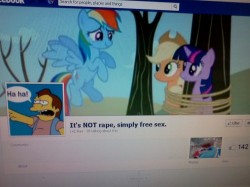 What is troubling is that Facebook has allowed certain posts, which are derogatory towards women, to remain on its pages, while penalizing feminists for speaking out against them. Facebook has allowed hyper-sexualized images of women to remain, as well as comments, posts and pages that support rape culture; Soraya Chemaly wrote an excellent article several months ago about Facebook’s misogyny problem.
What is troubling is that Facebook has allowed certain posts, which are derogatory towards women, to remain on its pages, while penalizing feminists for speaking out against them. Facebook has allowed hyper-sexualized images of women to remain, as well as comments, posts and pages that support rape culture; Soraya Chemaly wrote an excellent article several months ago about Facebook’s misogyny problem.
Rabid Feminist pointed out this particularly “fun” page on Wednesday, even after hundreds of women reported the page and many of the pictures, is still up and running. However, as The Body is Not an Apology’s petition reminds us, Facebook has censored images of:
1. Women who have beat breast cancer, including Joanne Jackson pictured above.
2. Women with children born with birth defects.
3. Women who breastfeed.
In researching this article, it appears there are many feminist pages, from all over the world, who feel they have been silenced by Facebook.
The uprising of women in the Arab world, a site with more than 60,000 fans from around the world, released a press release November seventh. It seems their five administrators were all reprimanded by Facebook to some degree, varying from a warning, to a 30 day block. All five women were warned they could permanently lose their accounts. They give the following explanation:
“Dana Bakdounes is one the hundreds of women and men who participated in the Uprising of Women in the Arab World campaign, holding a sign expressing the reason why they support this uprising. Dana’s slogan stated: “I am with the uprising of women in the Arab world because for 20 years I wasn’t allowed to feel the wind in my hair and on my body,” and her picture showed an unveiled woman carrying her passport with her picture when she was veiled.
Dana’s picture was initially posted on October 21, among many other photos and statements of women and men of various religious beliefs and practices (some women were veiled, some unveiled, some in niqab…), all demanding women’s rights and equally enjoying the freedom of speech, in a secular space that promotes tolerance and embraces the differences. But on October 25, Facebook chose to censor Dana’s image and to suspend for 24 hours the account of the admin who posted it. This incident provoked an outrage among the defenders of freedom of speech who started sharing Dana’s picture all over Facebook, Twitter and other media channels.”
It is difficult to understand what Facebook’s policies are exactly; it seems that the blocking has something to do with Facebook users reporting something they find offensive. While this can be helpful in some ways, the rules don’t seem to apply the same way towards all pages—and there does not seem to be much in the way of examining whether something actually is offensive, once it is reported as such.
Icelandic feminist, Hildur Lilliendahl, was recently temporarily blocked from posting content on Facebook, for the fourth time. The blocking began when she started collecting abusive public comments from men about women and/or feminists from around the web. Hildur published these comments on Facebook, in an album called “Men who hate women.”
The material Facebook termed “abusive” were screenshots of hateful, misogynist comments. Hildur was reported for re-posting other people’s comments, most recently resulting in a 30-day block. Facebook warned her that she must “stop violating the community standards of Facebook.” Keep in mind, this was after she re-posted a public status from a man with these kind words about her:
“If I ‘accidentally’ ran over Hildur, she is probably the only person on earth that I would back up over and leave the car on top of her with the hand brake on!!!) Put this in your ‘men who hate Hildur’ folder, Hildur Lilliendahl.”
The resulting petition on Change.org states; “I want to draw attention to the drawbacks of this platform, the Facebook and how easy it’s “community standards” make it to silence our voices.”
When I confirmed the story with Hildur yesterday, she gave this statement:
“I could have gone around the rules, I could have published the screenshots elsewhere and linked to them on Facebook, but I refuse to be silenced. I will not abide to rules that offend me. Neither will I allow corporate mass media to control my behavior.”
What seems unfair about Facebook’s blocking policies is that it is almost impossible to get in touch with a live person or even defend yourself. Thus, other than comparing stories, it is hard to know what Facebook’s actual policies are and how to best deal with them.
According to Facebook’s community standards page, there are nine types of content that may be deemed offensive and removed: Violence and Threats, Self-Harm, Bullying and Harassment, Hate Speech, Graphic Violence, Nudity and Pornography, Identity and Privacy, Intellectual Property and Phishing and Spam. If that is the case, why are sites such as It’s NOT rape, simply free sex allowed to exist, while women who are fighting back against violence and threats are punished?
Rabid Feminist, a popular feminist page with nearly 12,000 fans, shared a similar story a few weeks ago:
“I was locked out of my account for three days because someone complained that I called him a misogynist and a mansplainer (he was). They also removed an anti-rape poster, which I can only find an outline of a nipple beneath a full blouse. I was unable to get anything from Facebook explaining their actions”
In response, Rabid Feminist has set up a blog separate from their Facebook page, so that they can keep in touch with their fans.
A girl’s guide to taking over the world has experienced similar censorship on their page, which has more than 150,000 fans. One admin was blocked for sharing this image from my page, The Girl God, because the artwork shows a nipple. In response, A girl’s guide has created a ‘banned by facebook’ section in a gallery on their website, which is worth looking at. Wherein they state:
“Facebook is happy to have images of breasts for the purpose of male entertainment but breastfeeding is obscene and must be removed. The oyster image was deemed so offensive that the admin responsible was banned for seven days for posting it!”
The oyster image, is literally, a picture of an oyster.
Admins from A girl’s guide have been banned for every image posted there—and they still have more to add. One admin is currently on a 30 day ban because of an image that is a parody of a model image, copied by the Jackass Boys.
I have been blocked by Facebook, numerous times, to various degrees. Thankfully, my page has not been shut down yet but I have already formulated a Plan B. I am seeing stories all over Facebook about being blocked for three days or more. I am currently blocked for 60 days from making comments on other pages, although I was not given a specific reason why.
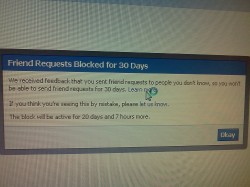 I am also blocked from making friend requests for 30 days.
I am also blocked from making friend requests for 30 days.
I have many liberal-minded friends who have been blocked from making friend requests; it begs the question, What is wrong with adding friends? In a world that is becoming increasingly global, where we are coming together more and more on ideas alone, is adding friends so dangerous?
On a sliding scale, I have to say that rape culture scares the shit out of me, whereas adding a few friends seems way down at the bottom of the danger list.
If you are not angry yet, here are a few more pictures to fuel the fire from It’s NOT rape, simply free sex. As of publication, all but three of these pictures were still up, while feminists from around the world worried about the fate of their pages.
I can attest that owning a page takes a great deal of effort. Aside from finding good posts throughout the day, you also must respond to people on your page and delete comments that may be offensive to others to keep it a safe space.
Furthermore, it has been suggested that the Facebook algorism takes people off your feeds if they do not regularly “like” your posts. Thus, losing control over your page for a few days or up to a month effectively cancels out your previous hard work.
We must create better networks of feminist pages so that we better can support each other; Facebook cannot shut us all down. If one sister page is down, the rest of us must spread the word about the injustice and keep the page going. Words of Women from the Egyptian Revolution was a great example of this after The uprising of women in the Arab world experienced problems; they staged a worldwide online protest on their page.
It is also important to note that there are other social media platforms available and that Facebook may not be the best way to share our message now that they have begun charging to promote posts. One such page, World Wide We, sounds promising:
“A new world is possible! Recent global events have given us a taste of the untapped potential of people coming together in new and exciting ways using social media. The vision of World Wide We (WWWe) is to help further realise that potential by moving beyond Facebook with a website that is designed specifically for people across the world to connect, share and act for positive change, easy to use with fresh, new tools, owned by the people, for the people (i.e. a Community Interest Company… that means no billionaire owners!)”
ZSocial is another: “ZSocial is the social network for individuals and groups striving to win a better world.”
My Digital Notebook is yet another site that is just coming together now—their slogan is, “The New Social Network For Self Expression.”
Obviously, there are many social media platforms available to us; it is important for us, as women, to stay connected, however that may be.
As Adrienne Rich said,
“The connections between and among women are the most feared, the most problematic, and the most potentially transforming force on the planet.“
The censorship of women on Facebook must stop; it is only when we speak up that we will truly know how widespread this problem is and change it. Please share your stories in the comments section below—we need a platform to discuss and change Facebook’s policies as they affect women. Then, we can organize and fight for change.
“Today more than ever we want to say to the world that our voices will not be silenced, not by Facebook, nor by patriarchy, dictatorships, military rule and/or religious extremism. They may be temporarily denied, overlooked, censored or whitewashed, but only to be uttered once again. We will continue to write on the dividing walls of fear, submission and defamation, if not tear them down.”
~
Ed: Bryonie Wise
Like elephant enlightened society on Facebook.



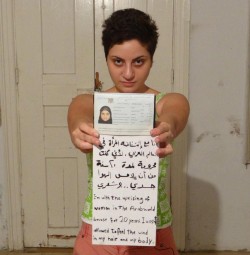
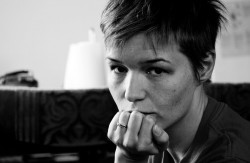
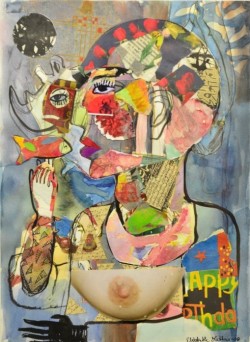
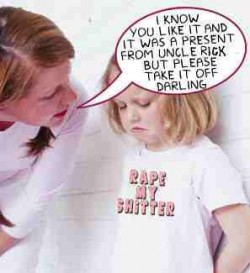
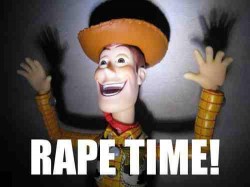

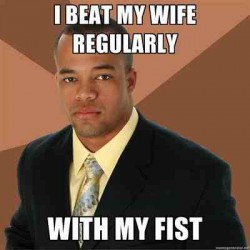




Read 133 comments and reply